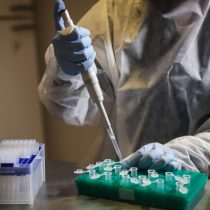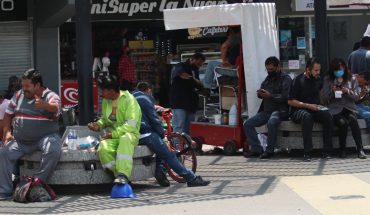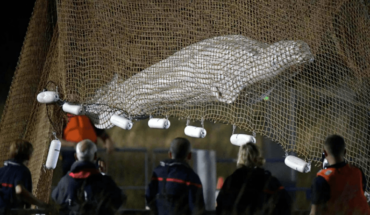
A few days ago, two members of Sebastian Piñera’s government justified the decisions made around the management of the Covid-19 pandemic in a very particular way. First, in a television show Minister Jaime Bellolio denied the relationship between increasing cases and attending religious rites, arguing, “I haven’t seen any scientific papers saying that happens at masses.” Days later, the mayor of the Metropolitan Region, Felipe Guevara, appealed to studies, supposedly from Europe, to state that “there is no point to point out that public transport is a focus of contagion”. Representatives of the Chilean government appealed to scientific evidence to deny any causal link between crowding people and increasing contagions. The funny thing is, it wasn’t the evidence itself, but its lack, I used it as an argument. Both Bellolio and Guevara seem to believe that silence gives reason.
These claims are surprising for a number of reasons. In addition to being counterintuitive, they contravene the recommendations of the experts. The authorities may assume that the events they comment on occur under ideal conditions, with the recommended capacity. However, it is well known that crowding people – especially at social events and peak schedules, when the population travels to work or returns home – prevents them from maintaining an appropriate social estating. For this reason, experts at the national level call for caution in the face of increased contagions, even recommending the total closure of spaces that favor crowds. The most serious thing about the arguments put forward by the authority is that they invoke the lack of scientific evidence to convince the safety of clearly risky situations. And, as if that were not enough, all this in a context where positive cases of Covid-19 go up in the country in the midst of the second wave of contagions. It is therefore appropriate to pause to consider more closely these arguments and the budgets which seem to give them relevance.
First, these trials fall into the well-known fallacy of asserting something by their denial. Since there are apparently no studies linking certain spaces to the increase in contagion, it is assumed that this relationship does not exist or is spurious. The use of scientific evidence proposed by authority is analogous to considering that a person agrees with something for not expressing otherwise or, worse, for expressing his or her opinion through avenues that the public authority decides to ignore or consider inappropriate. In other words, these arguments reflect a form of government that uses silence and ignorance as a form of legitimacy. This not only causes confusion where we need clarity – especially as to what is known and not known – but potentially damages the legitimacy of scientific knowledge and the work of expert commissions.
Second, to show that there is a lack of evidence and to support decisions in this is ethically and politically irresponsible. Anyone who hears these trials might think that there are no studies on covid-19’s relationship with public transport or religious rites. These kinds of statements call into question the public role of knowledge based on a political culture of post-truth, which usually express controversial ideas without sustenence and relativize scientifically produced knowledge.
Third, it may well be the case that a specific body of knowledge about some aspects of the pandemic, such as those mentioned in previous paragraphs, was lacking in the country. However, in the local context there are institutions and official spaces where measures have been recommended in this regard, such as centres of excellence, the Medical College, working tables, international committees and the same governance agencies that have s tried to improve traceability systems. However, this situation is useful for reviewing the relationship between scientific evidence and decision-making. Why is it important to make informed decisions? How are decisions made when no scientific evidence is available?
The current pandemic has only made visible a central feature of today’s societies: the relationship between science and politics is undoubtedly complex. What we call “evidence” does not mean the same in both spheres, and therefore its use and effects may vary when it is moved from one context to the other. In this regard, sociologist Gil Eyal (2019) describes the relationship between scientologypolitical as a three-track road. The track on the left corresponds to the policy and is high speed. Decisions must be made urgently on a daily basis. Often, these decisions involve blind trading, especially in cases where uncertainty about the results of those decisions is high. An example of this is the current pandemic, in which the scenario can change rapidly and unexpectedly, before epidemiologists responsible for organizing traceability of active cases can produce accurate knowledge about it. Another example may be natural disaster management or climate change, phenomena that require immediate action paths. Dealing with such uncertainty requires sufficiently developed knowledge of the causes of problems and their possible effects, in order to generate effective measures and react in time.
Returning to the road metaphor, the track on the right is the slow track and corresponds to science. Unlike the accelerated world of politics, scientific knowledge – especially academic forms of science, such as “basic science” or “science out of curiosity” – operates with longer deadlines, in relation to the methods used, the availability of technical, human and financing resources. Under normal circumstances, a scientist could spend years of his career researching problems that will not bring immediate benefits, but will show results several years after the findings. Examples of this remain, but there is no mention of the initiatives that currently exist to generate national vaccines against Covid-19.
Finally, there is a third clue, located between the fast path of politics and the slow path of science. This intermediate speed track is the connection between the two spheres. Several researchers have offered models to understand this connection: postnormal science (Funtowicz & Ravetz, 1990), the so-called “Production Mode 2” (Gibbons et al., 1994), “reflective science” (Beck et al., 2003), among others. These models have in common a reflection on how contemporary societies face uncertainty, in a context where our life forms are increasingly dependent on sophisticated technical and scientific knowledge. In a world characterized by complex problems, science must be more flexible and learn to communicate with decision makers and the general public; in turn, decision-makers need reliable information to proceed in the best possible way to the uncertain. Eyal places in this interface between science and politics the figure of the expert. The experts are specialists with a high degree of knowledge on specific topics that contribute to the debate with a judgment based on evidence, experience and common sense.
Even if we were in a scenario devoid of scientific evidence in the traditional sense, which concerns the expert and his profession, it is not true that we do not have relevant and scientifically informed data to make decisions. In this regard, Sheila Jasanoff (1990) submits that in ethically complex circumstances, where there is no conclusive evidence or lack of the voice of a single authority to support a decision, judgment and common sense, informed in the best available knowledge, allow to reach a verdict and act. On the other hand, scientific knowledge is not the only one relevant to informed decision-making. In addition to academically trained cognitive abilities, experts are characterized by experience-based know-how. That is, they have knowledge that develops in practice itself (Collins & Evans, 2009). By the way, I don’t mean by this that this knowledge is better or worse than that developed by traditional science. First, both ways of knowing are necessary when seeking political solutions to high-complexity problems. Second, it is not possible to ensure that a situation is less risky because it does not have a paper that reports a specific case, such as that of a mass or a micro during peak hours. Such an assertion represents a biased use of evidence that is not directed at the welfare of citizens.
Justifying bad decisions in the lack of evidence or, worse, not making any decisions about this absence, is a big problem. Operating in this way makes it clear that the reasoning, empathy or experience of those who face these situations on a daily basis – such as people who use public transport or attend religious events, but also health officials who experience the effects of the disease on a daily basis, are not valued. The recomtherefore, is not to reduce the evidence available merely to data. The expert voice of professionals and scientists, which corresponds to reasoning based on relevant and empirically noteworthy information, may well inform decision-making, since they are not arbitrary opinions: they are based on empirical evidence, disciplinary knowledge, and everyday experiences dealing with the pandemic and its effects.
This is why it is necessary to question strongly the justification for public measures – and even individual actions – based on sophsmas of the type “silence grants”. The absence of evidence on a controversial subject is not a source of legitimacy. These sophids are nothing more than the arbitrary instrumentalization of science as justification for political decisions in contexts of high uncertainty such as the current pandemic: misuse of scientific evidence does not contribute to informed and responsible decision-making. On the contrary, it undermines the legitimacy of expert knowledge and perverts decision-making processes in democracy.
Bibliographical references
Beck, U., Bonss, W., & Lau, C. (2003). The Theory of Reflexive Modernization Problematic, Hypotheses and Research Programme. Theory, Culture & Society, 20(2), 1-33. https://doi.org/10.1177/0263276403020002001
Collins, H., & Evans, R. (2009). Introduction. Why Expertise? In Rethinking Expertise (pp. 1-12). The University of Chicago Press.
Eyal, G. (2019). The crisis of expertise. Polity Press.
Funtowicz, S., & Ravetz, J. (1990). Science for Policy: Uncertainty and Quality. In Uncertainty and Quality in science for policy (pp. 7-16). Kluwer Academic Publisher.
Gibbons, M., Limoges, C., Nowotny, H., Schwartzman, S., & Trow, M. (1994). The new production of knowledge. The dinamics of science and research in contemporary societies. Sage.
Jasanoff, S. (1990). Rationalizing Politics. At The Fifth Branch. Science Advisers as Policy Makers. Harvard University Press.
Gonzalo Aguirre Orellana is assistant researcher of the ANID-PIA SOC180039 project, Alberto Hurtado University.





